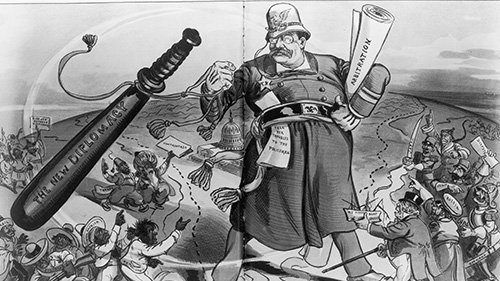Challenge Accepted! Successful Review for the AP® Human Geography Exam
We are just weeks away from the AP® Human Geography Exam—wow! As teachers we are nervous, anxious, and hoping that we have done everything we can to...
AP & Honors Mathematics
Explore Wiley titles to support both AP and Honors mathematics instruction.
Literacy Skills & Intensive Reading
Connections: Reading – Grades 6–12
Empower student success with a proven intensive reading program that develops strong reading skills in striving readers.
Drama, Speech & Debate
Basic Drama Projects 10th Edition
Build students’ confidence and competence with comprehensive, project-based theatre instruction.
Literature
Connections: Literature
Support learners as they study dynamic, relevant texts and bring the richness of diverse voices to students through literature.
Literature & Thought
Develop critical thinking, reading, and writing across literacy themes, genres, historical eras, and current events.
Language Arts
Vocabu-Lit® – Grades 6–12
Help students build word power using high-quality contemporary and classic literature, nonfiction, essays, and more.
Connections: Writing & Language
Help students develop grammar, usage, mechanics, vocabulary, spelling, and writing and editing skills.
Reading/English Language Arts
Measuring Up to the English Language Arts Standards
Incorporate standards-driven teaching strategies to complement your ELA curriculum.
English Language Learners
Measuring Up for English Language Learners
Incorporate research-based best practices for ELLs with an approach that includes a focus on language acquisition strategies.
Mathematics
Measuring Up to the Mathematics Standards
Incorporate standards-driven teaching strategies to complement your mathematics curriculum.
Foundations
Measuring Up Foundations
Help students master foundational math skills that are critical for students to find academic success.
Science
Measuring Up to the Next Generation Science Standards
Give students comprehensive NGSS coverage while targeting instruction and providing rigorous standards practice.
Assessment
Measuring Up Live
Deliver innovative assessment and practice technology designed to offer data-driven instructional support.
For a better website experience, please confirm you are in:
3 min read
David Palmer Apr 4, 2025 8:15:00 AM

It’s the time of year when teachers and students begin their final push towards preparing for the AP Human Geography exam. Teachers and students often ask me, “What should I study?”.
Preparing for exams is stressful, exhausting and exhilarating. My goal with students at this time of year is to coach and encourage them to follow a realistic 4-to-6-week schedule of preparation, be disciplined in their studying and convince my students that preparation has a positive impact on their score. Not surprising but needs to be stated: Students who have a solid understanding of vocabulary (key terms), concepts and the essential skills will typically perform better on the exam. Wow!!
I tell my students to review and study 1-2 units per week up until the exam in early May. Students should read the AMSCO AP Human Geography book, if they have not already, and focus work on understanding vocabulary (Key Terms), geographic skills and practice applying their knowledge and skills with sample multiple choice (MCQ) and free response questions (FRQ).
You can use the vocabulary from the CED or from the AMSCO book. I have my students locate the vocabulary in each section of the book and use a pencil to write a question mark(?), ok or star (⭐️) next each word using the following criteria. You can also provide a printed list for each unit (See included Unit 4 Handout). For each term a student should be able to define the term and give an example to illustrate their understanding. A “?” indicates that a student cannot define or understands the term. An “ok” means they recognize the word and can provide a partial definition or example. A star (⭐️) indicates that they understand the term, can define the term and give an example to illustrate their understanding. Students should be honest in their assessments because the goal of studying will be to move “?” to “ok”, and “ok” to stars (⭐️). Please note, all of the key concepts in the AMSCO book include a definition and a concrete example. Students are not limited to the examples in the book, but I encourage students and teachers to add additional examples if they can.
A word of caution: Just vocabulary mastery is not enough to be successful on the exam, but vocabulary (Key Term) mastery does make the test much more manageable.
Students should be comfortable applying the concepts of the course to a variety of scenarios, case studies and stimuli (maps, charts, graphs, images). But also, be able to apply the concepts of the course at different scales (Topic 1.6) and describe impacts using the ESPN+DC concepts (See Introduction page XXIX). Students should review all the skills in the Introduction and reread all of Unit 1 in the AMSCO book. Every question on the exam assesses a specific concept (Key Term) and an essential skill. It is a major preparation error for students to gloss over the content of Unit 1 “Thinking Geographically”.
The CED and the AMSCO book provides a variety of scenarios that the exam can cover. Review the list of “Must Know Case Studies” in the “Unit 4 Political Geography Key Terms” handout provided. Students should review the AMSCO book related to these case studies and have a sense of what is going on related to the content of the course for each of the countries listed. If a specific country is listed in the CED it is fair game to become the focus of an entire question on the exam. When writing the AMSCO book we were careful to include information about any country or case studies specifically mentioned in the CED. Every unit of the course has specific case studies that students should be aware of and have a familiarity with the countries or regions specifically mentioned in the CED and the AMSCO book.
Students should do the activities at the end of each chapter of the AMSCO book, take practice MC questions, review sample FRQ questions, and use the resources in the AMSCO book and AP Classroom. Teachers can create opportunities for students to work collaboratively in small groups with vocabulary, stimuli, MCQs, FRQs or rubrics. The key is for students to be practicing and studying with effort, honesty and extensively over the next few weeks.
In summation, the students who are most successful on the exam, study and master the vocabulary and concepts of the course and have the ability to apply the concepts and skills to variety of scenarios and case studies.
You got this!!!

We are just weeks away from the AP® Human Geography Exam—wow! As teachers we are nervous, anxious, and hoping that we have done everything we can to...

So, you have taken the plunge and are now teaching AP® Human Geography. People will ask “What is Human Geography?” but you have no idea how to answer...

This blog entry is designed to provide some hints to help your students improve their writing on the free-response section of the exam. The...

The AP® Human Geo test is fast approaching. But don't stress! Author David Palmer offers words of encouragement and advice for seeing your students...

It’s about that time. The Advanced Placement® Government & Politics Exam is around the corner. I’m sharing my top five tips to help you prepare...

The Supreme Court question on the AP Government exam, a mandatory component, consistently challenges students to demonstrate a nuanced understanding...

Primary sources provide students with a personal window into the past, enabling them to view history as human stories rather than a list of facts....

For many students, the most intimidating part of an AP® Social Studies exam isn’t the content—it’s the rubric.

Over the years I’ve come to realize that, like any other subject, Macroeconomics is best retained when connections are made. It is for this reason...

Political cartoons have influenced the public and brought about change like other tools in the press. The historic 1754 cartoon of a sliced-up snake,...

Experienced AP World History teacher Dave Drzonek and AP World History Exam table leader Charlie Hart discuss what students did well and what they...

As the AP® exam draws near, students often become increasingly anxious. Review games and activities can target areas students need to review while...
